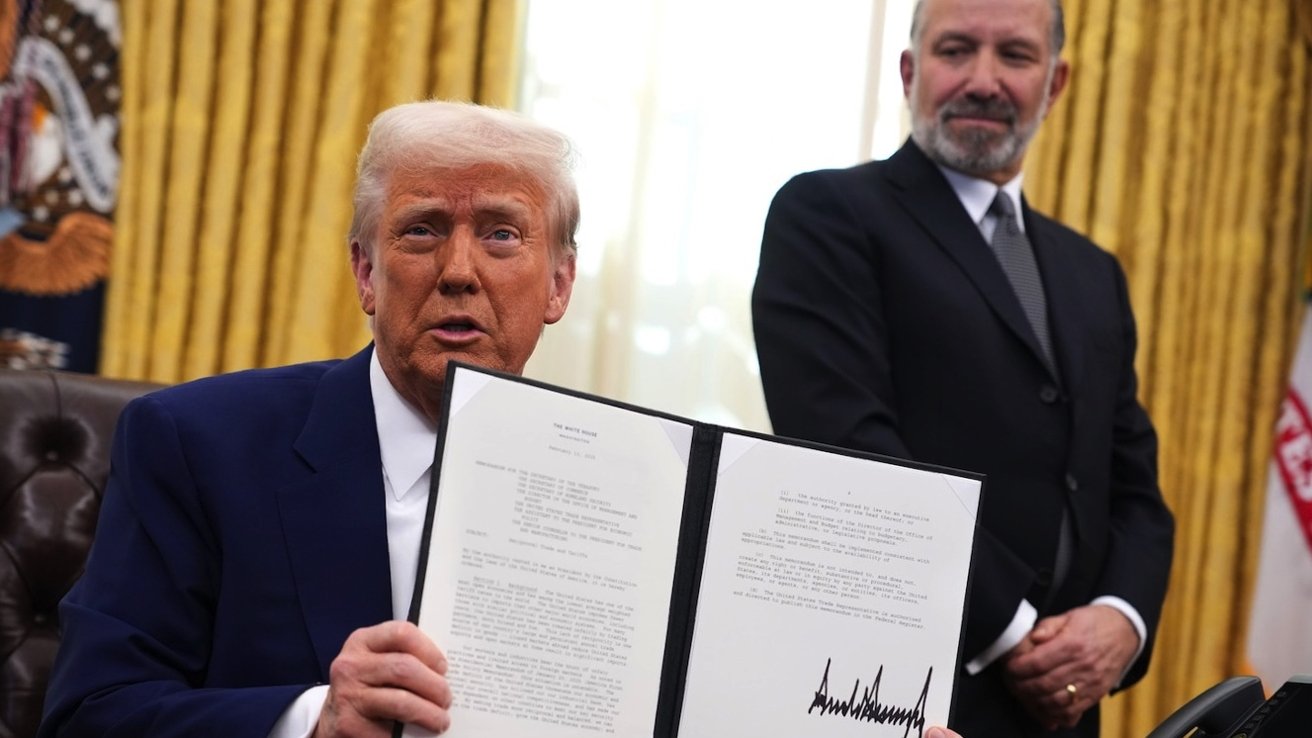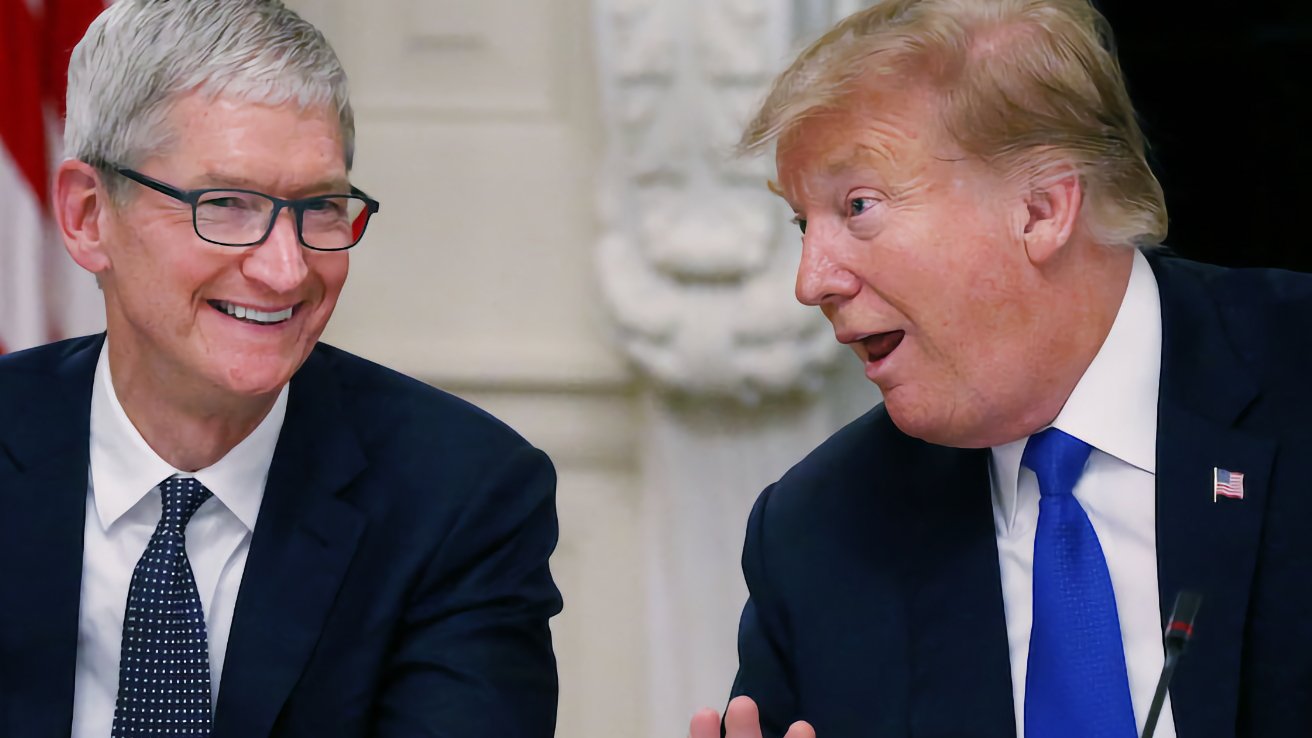While markets fluctuated insanely on rumors, the third consecutive trading day after the blockbuster tariffs announcement has again ended very badly for Apple, with it seeing billions more bled off of valuation.
Apple's shares were trading at $223.89 on April 2, 2025, before Trump imposed raised the cost of it doing business with every single one of its overseas suppliers. As with all stocks, Apple's shares took an immediate hit, dropping 7.5% overnight.
And, on Monday, the sell-off continued. At the close of business, Apple stock ended a tumultous trading day at $181.46, a $6.92 hit from Friday's close.
And during the day, historically bullish Morgan Stanley also revised its worst-case estimate that Apple shares would drop no lower than $200, because they did. When the shares were just under $200, Morgan Stanley estimated the cost to Apple was around $33 billion.
It wasn't over, though. By noon ET on April 7, Apple shares were down still further to $178.62.
They had continued to fall steadily since the announcement of the tariffs, but then Trump threatened to raise the China tariffs to from 54% to 104%. In one Truth Social post, Trump doubled Apple's costs of importing its components or devices from China.
Trump's White House also extinguished the closest AAPL has come to any sign of recovery. A claim that Trump was considering pausing the tariffs dubiously extracted from a Fox News interview saw the stock market jump back up — only to be smashed right back down again when officials called it "fake news."
The S&P 500 index rose 7% on the basis of the rumor, only to fall back again. Overall, on Monday, the S&P 500 dropped 69.56 points — or 1.46% — by noon eastern time.
At that point it was listed as 4998.32. Immediately prior to the original tariff announcement, it was at 5670.97. The S&P closed at 5062.25, down .11% on the day.
Trump's tariffs have had a similarly calamitous impact on stock markets around the world, which has in turn rebounded on the US. Following overseas falls, US stocks themselves dropped around 20%, and consequently the S&P 500 briefly entered a bear market status on Monday.
A bear market is when stocks fall 20%, and while it does not automatically mean a country is heading for recession, it can be a precursor to that. The S&P 500, at least briefly, rose back out of the bear market status, but the Nasdaq Composite Index is in one.
Apple has been hit the hardest by the tariff tumult
Apple is repeatedly said to be at least one of the worst-affected companies, because of its near total dependence on overseas firms. The company did manage to step up imports ahead of tariffs to avoid these extra costs, but even adding five flights full of iPhones will only help for so long.
And, it won't help September's iPhone 17 at all.
It was already believed inevitable that Apple will have to raise prices for consumers. But with all firms having to raise prices, consumers' ability to buy goods will be dramatically cut, so even a price increase will not mitigate Apple's losses.
 William Gallagher and Mike Wuerthele
William Gallagher and Mike Wuerthele








-m.jpg)






 Christine McKee
Christine McKee
 Malcolm Owen
Malcolm Owen
 Marko Zivkovic
Marko Zivkovic

 Andrew Orr
Andrew Orr
 Andrew O'Hara
Andrew O'Hara
 William Gallagher
William Gallagher





-m.jpg)



19 Comments
I don’t see where the constituency for these tariffs is, in the medium to long term. Anyone involved with the tech sector can’t be happy with this. The very wealthy can’t be happy as their portfolios lose value. Corporate America is surely taking a financial bath as well. The impulsiveness and chaos of this “policy” does not lay the groundwork for making long-term investments to do anything like move manufacturing here. Based on some of the comments here, the MAGA crowd is currently buying the talking points, but that’ll drop off eventually as reality sets in with inflation and recession. Inside traders and market speculators are probably happy right now, but that’s not sustainable either. Gamblers eventually lose money and inside traders have nothing if they drop off the most favored crony list, and for that, it’s worth observing that Donald Trump does not have any old friends.
This is all illegal and unconstitutional. The IEEPA is intended to be used for sanctions against foreign governments. It make no mention of tariffs or taxes.
"Under art. 1, § 8 of the Constitution, Congress has sole authority to control tariffs, which it has done by passing detailed tariff statutes. The President cannot bypass those statutes by invoking “emergency” authority in another statute that does not mention tariffs. His attempt to use the IEEPA this way not only violates the law as written, but it also invites application of the Supreme Court’s Major Questions Doctrine, which tells courts not to discern policies of “vast economic and political significance” in a law without explicit congressional authorization. If the IEEPA were held to permit this executive order, then the statute would run afoul of the nondelegation doctrine because it lacks an “intelligible principle” to limit or guide the president’s discretion in imposing tariffs."
https://nclalegal.org/press_release/ncla-sues-to-stop-trump-admin-from-imposing-emergency-tariffs-that-congress-never-authorized/
We’ll see if Apple goes forward with their announced $500B investment to build data centres. Big corps are shutting their investment wallets due to all the volatility caused by the orange orangutang.